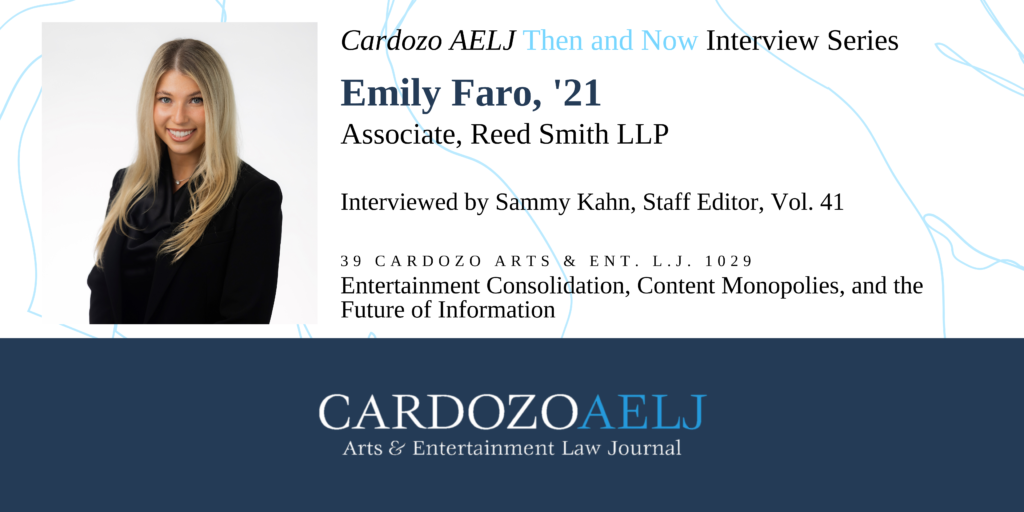
Emily Faro, Cardozo Law Class of 2021, is an Associate at Reed Smith. Emily’s practice focuses on entertainment and media, advertising, marketing, data privacy and security, and corporate transactions. Emily was a Staff Editor on Volume 38 of the Cardozo Arts & Entertainment Law Journal, and her Note, Entertainment Consolidation, Content Monopolies, and the Future of Information, was published in Volume 39, Issue 3.
Our interview with Emily was conducted by Sammy Kahn. Sammy is a Second Year Law Student at the Benjamin N. Cardozo School of Law and a Staff Editor on Vol. 41 of the Cardozo Arts & Entertainment Law Journal. Sammy is interested in corporate law, entertainment law, and antitrust.
SK: If you rewrote your Note today after even a short period of time, how would your thesis change?
EF: The COVID-19 Pandemic completely changed my thesis. Prior to the Pandemic, major entertainment consolidation seemed inevitable. Media companies were acquiring various other media companies constantly in the years leading up to 2020. Because of the proliferation of streaming during the 2020, media companies’ revenues thrived more than they had in previous years and media mergers were not occurring as frequently as they were prior. While antitrust law is still not equipped to address modern-day technologies, there is genuine competition in the media ecosystem in 2023.
SK: With today’s media and entertainment industry layout, it is very rare for any mergers to strictly be “horizontal” or “vertical.” Do you think there should be new terminology for these tech mega-mergers?
EF: Modern technology is no longer linear. Almost every major media company operates in different facets – social, advertising, technology, finance, etc. The terminology that was coined over a century ago no longer applies. The standards for these mergers are multi-faceted and take experts in many industries to understand the nuances and intricacies of media mergers.
SK: What do you think are the main drivers today for the recent consolidation in the media and entertainment industries?
EF: Strategic acquisitions. Companies are thinking about technology and what the world will look like in 5, 10, years. Technology trends are moving faster than ever and we all have our sights on the Metaverse and what that can mean for brands. The industry is focused on cutting-edge technology that can make their consumers’ lives easier and more enjoyable.
SK: How closely related is your work today to the topics which you wrote your Note on?
EF: I am an advertising lawyer and do mostly transactional work (e.g., contract drafting and negotiations). My note does not exactly relate to my line of work, but my understanding of various media companies and their subsidiaries is helpful to understand and meet my clients’ needs.
SK: What advice would you give to other young attorneys looking to enter the entertainment industry?
EF: I am sure all students are sick of hearing this, but network. Go to events. I had colleagues that forewent industry events and regretted it later and after law school. Studying is important and getting good grades and internships are helpful for securing jobs, but meeting connections are just as important. Additionally, when meeting connections, do not just focus on the short term. You may not want a job at a certain company, but you do not know where their employees will be down the road. Stay connected. Join organizations in law school and really participate (e.g., join the board)!
Read up on industry news and discuss current issues when you meet people. Of course, do not bore your connections, but showing that you are keeping current and analyzing the issues is important.



